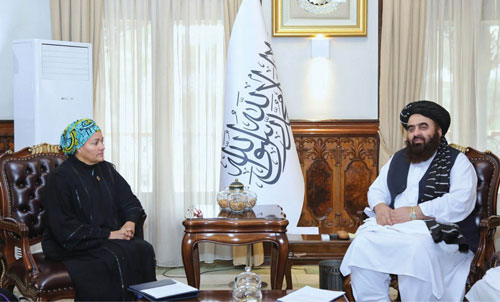The Islamic Emirate of Afghanistan’s (IEA) foreign minister, Amir Khan Muttaqi, said Wednesday the international community has not done anything to warrant him convincing the IEA leadership to change policies.
Muttaqi made the remarks during a meeting with visiting Deputy Secretary-General of the United Nations Amina Mohammad and her delegation of top UN officials.
Among the issues under discussion is the ban on women’s education and the ban on women working for NGOs.
“As a foreign minister, I have the responsibility to convince you, the people and the government. What has the United Nations done with which I could convince my leaders and my people? Sanctions have been imposed on Afghanistan. There are still sanctions on the banking system. Traders are facing serious problems. They cannot transfer money even for food items and fuel,” Muttaqi said.
He said that Afghanistan’s seat at the UN is held by a person who does not represent the government, people or any other party.
He also said that despite the Doha Agreement, IEA leaders are still on the UN blacklist, and that this will not improve relations because they cannot travel and hold talks with the international community.
“When they cannot travel abroad and hold talks with you and others, how could relations improve,” Muttaqi told the UN delegation.
Referring to the issue of education, Muttaqi said that currently nine million students are getting education across the country.
“If one million students are left out of education, nine million others including boys and girls are getting an education. They are also humans and need assistance. Why is the international community not assisting them,” he said.
The foreign minister said that the IEA has cooperated well in delivering humanitarian aid even to areas that were never covered in the past 20 years.
“Now when restrictions have been imposed, we should use patience and find a solution for it,” Muttaqi said.—Ariana news










